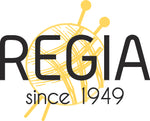03/09/2021
FAQ - Are REGIA yarns mulesing-free?
We want our yarns to be used with joy and a clear conscience. Pursuant to our animal welfare policy, we use only mulesing-free raw wool for our yarns. We also expect this respect for the environment and all living beings from our suppliers and have obligated them to source and process only mulesing-free raw wool. We also expect our suppliers to present confirmation of compliance.
The practice of mulesing, a procedure performed as part of the merino yarn production in Australia, is connected with animal suffering. In Australia, this is sometimes used to prevent merino sheep from being infested with parasites. In other countries of origin of merino wool, the practice of mulesing is either prohibited by law or not necessary due to climatic conditions.
REGIA sock yarn
REGIA sock yarn consists of 25% polyamide and 75% pure new wool. The raw wool for the pure new wool does not come from Australia, and not from merino sheep, either. It comes from different breeds of sheep from Germany and South America, where the fibers are durable enough to meet our expectations for our sock yarns. Thus we source the raw materials for REGIA from regions in which mulesing is not practiced.
Mulesing in Australia and New Zealand
Australian merino sheep in particular are in danger of being infested with Lucilia cuprina (Australian sheep blowfly), causing them to suffer from painful and debilitating conditions that are often fatal for the animals. The blowfly was introduced in Australia in the early 1900s and has since become a major risk for the health and well-being of Australian sheep.
For many years, the practice of mulesing seemed to be the most effective long-term treatment to protect the animals from being infested. For the animals, however, mulesing is very painful and agonizing and is incompatible with today´s understanding of animal welfare. In 2005, the Association of Australian sheep farmers established a program to promote alternatives to mulesing and to at least provide the animals with anesthesia and pain medications during mulesing.
Thus, Australia as the country of origin doesn´t inevitably mean that the yarn isn´t mulesing-free. New Zealand is also often mentioned in connection with mulesing, however the country has since prohibited this practice.
Pictures: The atmospheric photos of the sheep we found on Pixabay (Link: https://pixabay.com/) - Pixabay is a creative community that shares images and videos copyright free with others. We did not pay attention to the race or origin of the sheep shown.
